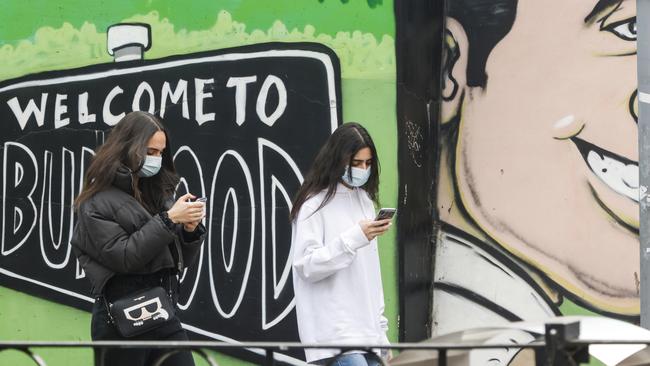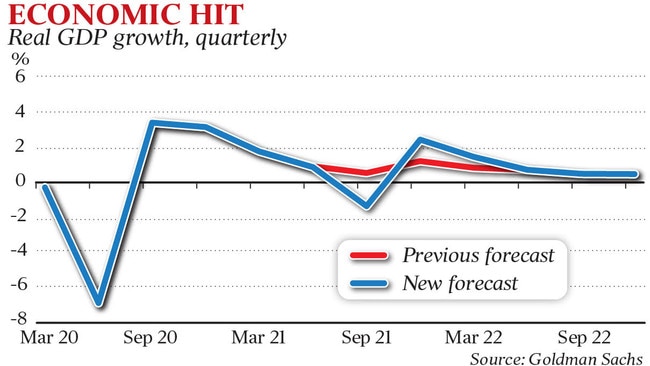Business calls for ‘smarter’ Covid-19 lockdowns
Pandemic restrictions are costing the nation $2.8bn each week and have caused 1.6 million Australians to lose their jobs or have their hours cut, modelling finds.

Pandemic restrictions are costing the nation $2.8bn each week and have caused 1.6 million Australians to lose their jobs or have their hours cut, as businesses push for a “smarter approach” to lockdowns and expanded financial support for employers.
New modelling by Ernst & Young, commissioned by the Business Council of Australia, found that restrictions in Greater Sydney accounted for nearly two thirds of the weekly economic hit at $257m a day and that partially reopening construction in the city would inject $500m a week back into the state economy.
The BCA is using the new research to make the case for a nationally consistent approach to managing the more infectious Delta strain to “provide milestones around lockdown stages to remove the day-to-day guessing game around rules and decisions”.
The new EY modelling came as Goldman Sachs chief economist Andrew Boak estimated lengthy restrictions in the country’s biggest city – alongside a shorter period of scaled-back restrictions in Victoria and South Australia – would slash about $12bn off the national GDP and drive a 1.4pc economic contraction in the September quarter.
With NSW Treasury looking at the cost of extending Greater Sydney’s lockdown to mid-September, Mr Boak said he expected “a significant step-up in support over the coming week” to accompany any announcement around how long restrictions could last.
Mr Boak argued the Covid disaster payment could be scaled up from $600 to $750 a week and unemployment benefits temporarily increased to offset the hit to workers from an extended Sydney lockdown.
BCA chief executive Jennifer Westacott warned lockdowns had “enormous economic and social costs and should be a last resort”.
“But where they are used, we need to move from snap to smarter lockdowns,’’ she said. “We need to provide more certainty and stop people worrying day-to-day where they stand.”
The big business lobby group said a nationally consistent definition of a Covid-19 “hotspot” should be applied, and that “lockdowns should be localised to affected areas rather than automatically locking down entire states”.
This would mean the severity of restrictions applied by states would be uniform across the four stages of lockdowns, and would be triggered according to the same level of Covid transmission.

Additionally, “public health orders should reflect the increasing vaccination rates and reduction in risk”, the BCA said.
Josh Frydenberg on Monday hinted at further commonwealth support for affected households and businesses, saying “our policies are never set and forget”.
“We continue to assess all our payments, both business and income support, and determine the right payments for the right circumstances,” the Treasurer said.
CBA’s head of Australian economics Gareth Aird said he assumed the NSW government would have to allow construction work to reopen ahead of the easing of broader restrictions, saying shutting down worksites was simply “too costly”.
Mr Aird said there was a good chance that the country could achieve 80 per cent full vaccination rates by October or November, and NSW’s lockdown could last until that point.
He said the lifting of restrictions halfway through the December quarter would trigger an economic bounce-back that would mean the country would avoid two consecutive quarters of negative growth and therefore a second recession in as many years.
But under this scenario, the economy would still be smaller by the close of 2021 than it was at the middle of the year, he said.
The BCA said NSW’s JobSaver support for businesses, co-funded by the federal government, should be upgraded and applied nationally to work in tandem with the federal Covid disaster relief payment for affected workers.
The JobSaver weekly payment cap of $10,000 to eligible businesses should be removed, and should replace more than 40 per cent of a company’s payroll, it said.
The scheme should be expanded to companies of all sizes, with similar turnover tests to JobKeeper. And it said the requirement that firms keep staffing levels stable to be eligible for the support would replicate JobKeeper’s success in keeping workers attached to employers.




To join the conversation, please log in. Don't have an account? Register
Join the conversation, you are commenting as Logout